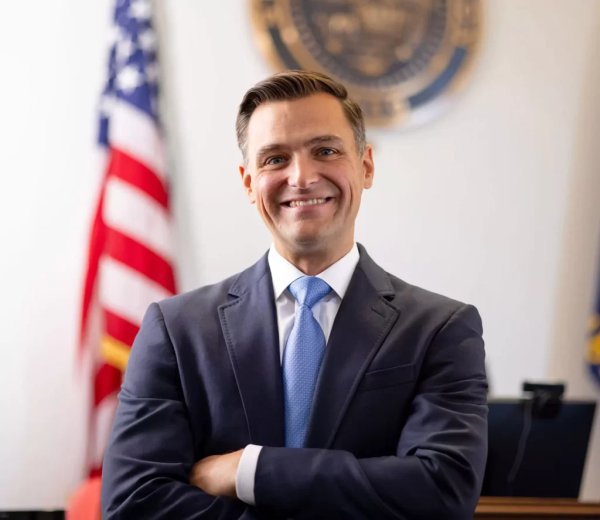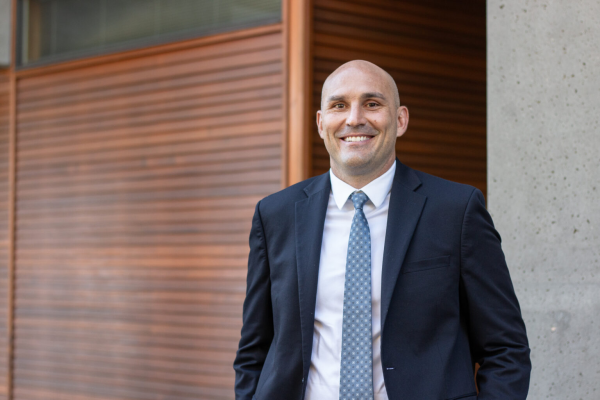

It’s time for Oregonians to elect a new attorney general. The position, which leads Oregon’s entire Department of Justice, currently faces challenges to the state’s gun laws, while also playing a key role in mitigating the fentanyl crisis and protecting communities from organized crime. The race has brought in over $3 million of campaign fundraising, posing Nov. 5 to be a climactic end to a heated and expensive race.
The Democratic Party has put former Oregon Speaker of the House Dan Rayfield into the race. Rayfield started his career as a private attorney, focusing on civil litigation and then moving on to represent individuals with claims against large corporations, most notably insurance companies. Rayfield then ran for state representative in 2016, winning a seat for Oregon’s 16th district, centered around Corvallis. He helped pass legislation extending unemployment insurance benefits and was praised by the Oregon League of Conservation Voters for fixing a $30 million budget shortfall for the Oregon Department of Fish and Wildlife. Most recently, as speaker of the House, Rayfield has worked to pass bipartisan gun and housing legislation, and has strengthened Oregon’s environmental laws.
Rayfield hopes to continue his work in the state legislature as attorney general. If elected, he’s looking to expedite the process of moving resources set aside by legislation into communities. The attorney general’s role is, in part, to award grants and allocate the extensive Department of Justice (DOJ) budget. Rayfield is prioritizing community safety — focusing on gun violence and substance use — and defending legal challenges to Oregon’s reproductive health and environmental laws.
The Republican Party has put forth Will Lathrop as their candidate. Lathrop began his career in Oregon’s Marion and Yamhill Counties. While in the state, Lathrop chaired the Sex Offender Protocol Board and also served on the Oregon District Attorney Association’s legislative committee. In 2015, he began work as a director with the International Justice Mission (IJM) to prosecute sex trafficking and child abuse crimes in Uganda and Ghana. The IJM partnered with the U.S. State Department, the British government, the German government, and the United Nations International Children’s Emergency Fund to protect hundreds of women and children from sexual crimes and trafficking. Lathrop returned to Oregon to run for attorney general. He has garnered endorsements from many victims and victims’ rights groups, partially due to his work defending sexually abused or exploited women and children.
Unlike Rayfield, Lathrop isn’t a politician, and he believes in the non-politicization of the DOJ, arguing that his distance from political office makes him the best candidate for the job. Being far from politics is a key part of his campaign and is important to his supporters. “He is not going to let politics get in the way of him doing his job and doing his job the way it should be done,” says Vanessa Williamson, a voter and Lathrop supporter from Arlington, OR. Lathrop hopes to use his extensive trial experience as attorney general to focus on victims’ rights for any crimes from gun violence to substance abuse to sexual crimes.
Both candidates agree on the major issues that need to be solved. Oregon has one of the highest homelessness rates per capita in the country. The number of fentanyl overdose deaths has tripled from 2020 to 2022, and gun violence, especially in schools, continues to plague the state. The attorney general will focus on all these issues, and both candidates have different plans on how to combat them.
Gun Violence
Gun violence is a conversation that is had in many spaces and at all levels of government: from informal conversations among students and school leaders to formal presidential debates. Gun violence — especially in schools — is a topic that has become more and more prevalent in recent years.
Rayfield plans to combat gun violence by allocating resources to preventing the spread of “ghost guns,” a term used to describe unserialized and therefore untraceable firearms.
Rayfield also intends to protect Measure 114, also known as the Reduction of Gun Violence Act, which establishes a permit system for gun ownership and bans the sale, transfer, and importation of magazines that are capable of holding more than 10 rounds of ammunition. The law is currently on hold due to a pending appeal. “Right now the Department of Justice is defending the constitutionality of that [law], and I will continue to use resources to do that,” says Rayfield.
Rayfield also has an “integrated plan” for combating gun violence. One part of that plan is continuing a recently created task force inside the DOJ to influence policy. Rayfield also plans to crack down on licensing when it comes to selling firearms. “One of the things that I think needs to be focused on is the licensing of gun dealers in the state,” Rayfield notes. “We need to strengthen our accountability in that area.”
Lathrop, on the other hand, argues that the attorney general’s job isn’t about policy. “We pass a lot of laws in Oregon, and we boast about the laws we pass, but we’re not enforcing those laws. That’s the critical issue in Oregon. We don’t have a law creation problem; we have a law enforcement problem,” Lathop said in a KOIN 6 News debate on Oct. 16. Lathrop is arguing that instead of including policy in his approach, like Rayfield, he is committed to enforcing the gun laws already in place in Oregon with the DOJ and legislation. Lathrop’s scope on the issue only includes law enforcement. Lathrop’s campaign did not respond to requests for comment.
Substance Use
Lathrop’s approach to the critical issue of substance use, and especially the fentanyl crisis, takes on a larger scale. The role of the attorney general is to prosecute organized crime, like drug dealing, and Lathrop intends to go after drug cartels that bring fentanyl and other harmful drugs into the state. “The attorney general’s office needs leadership and needs somebody who will stand up to the foreign drug cartels,” Lanthrop argued in the KOIN 6 News debate. He continued, “[somebody] that’s not scared to say the word drug trafficking, that’s not scared to say the word drug cartel, and will push these people that are making so much money off of killing Oregonians out of our state.”
Rayfield also notes that he intends to prosecute drug cartels, but his approach takes on a more community-oriented angle, focusing on getting resources allotted by the legislature into communities more efficiently. “[The] process of getting the dollar from point A to point B is bogged down through the DOJ which has to review contracts … which obviously delays outcomes,” Rayfield explains. “One of the things that I want to do is improve that process and [its] efficiency.” These funds go into community rehab programs, local law enforcement agencies, private companies, and nonprofit organizations in the form of grants that help combat drug use in communities all across Oregon.
Reproductive Healthcare
Lathrop intends to defend Oregon’s long-standing abortion laws while pitching himself to be the most trusted choice for Oregon women. He cites his background prosecuting domestic violence cases, as well as sexual assault cases. Lathrop’s main focus is continuing the status quo of abortion access in Oregon.
On this issue, both agree, as Rayfield pledges to do the same. He focuses on a hypothetical “national attack” on Oregon’s abortion laws and pledges to continue current attorney general Ellen Rosenblum’s work, co-leading a multi-state lawsuit to lift restrictions on the drug mifepristone, which is commonly used in abortions.
Domestic Crimes
Both candidates have come out in support of the Internet Crimes Against Children (ICAC) task force, which investigates and prosecutes online sexual abuse and hate crimes against children. In 2022, the ICAC received over 7000 tips, a 354% increase from the last five years. The legislature recently increased the budget for the ICAC, and Rayfield has committed to filling the new roles awarded by the legislature with competent attorneys. Rayfield notes that it’s still early: “The next step is to monitor and see what the caseload is, and we need to look at the resolutions.”
Another key issue is elder abuse. Lathrop notes that he’s handled many of these kinds of cases before. “When we have lawlessness, when we have predatory behavior, when you can’t ride the metro because it’s dangerous, … it’s seniors that feel it first and seniors that feel it worst,” he said in the KOIN 6 debate. Rayfield has committed to expanding a state fund for elder abuse education and protection.
From fentanyl to gun violence to domestic abuse, Oregon’s leadership faces many issues. The attorney general, having a wide range of responsibilities, is at the forefront of battling these crises. Rayfield and Lathrop agree on what many of these key issues are and what to prioritize. But they differ in how they go about it, with Rayfield focusing on influencing policy and swiftly moving resources, as well as fighting in the courtroom; and with Lathrop committed to keeping out of politics and defending Oregon’s laws. Both candidates are experienced lawyers and committed Oregonians who have their own vision they are hoping to bring to the office of the state’s attorney general.


































